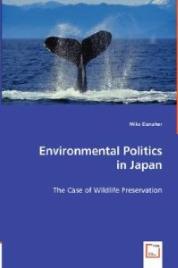Author says anti-whaling 'hits wall' within Japan
Published on 09 July, 2008
Foreign pressure against whaling finds no significant allies within Japanese domestic politics to align with, because the Fisheries Agency has been effective at redefining the issue as being about national pride and food security.
That's according to CQUniversity researcher Dr Michael Danaher whose new book Environmental Politics in Japan: The case of wildlife preservation has just been published by German company VDM Verlag.

"In the book I argue that apart from a common sense of purpose that binds the different policy actors together, Japan's poor record on wildlife preservation is a derivative of the way environmental NGOs have been marginalised and excluded from the policy process," Dr Danaher said.
"This argument links to Japan's public safety and food and economic security concerns whereby these concerns tend to frame and guide policy-making on wildlife and nature issues. For example, many wetlands were destroyed for agricultural improvement projects.
"Japan wants to continue to harvest whales for a number of reasons.
"Firstly, Japan sees whaling as a cultural tradition and symbolic of its dependence on seafood as its main source of protein, so it is not prepared to allow any country to erode this vestige of self-determination even though it risks international condemnation.
"Secondly, Japan's whaling is well within the rules of the International Convention for the Regulation of Whaling.
"Thirdly, Japan believes it is undertaking, and can continue to undertake, sustainable whaling because it bases its harvests on well-managed and open science which is overseen by the IWC's Scientific Committee. Moreover, the countries and NGOs that are criticising Japan cannot prove that Japan's catches are unsustainable.
"Fourthly, there is a lack of any significant domestic anti-whaling movement. Furthermore, the United States (Japan's main trading partner) now seems to only threaten, not enforce, sanctions on Japan."
Dr Danaher said the likely effect on the global environment depends on whether or not Japan will expand its hunting of whales to an unsustainable level.
"Now of course, there is no sense in doing this for Japan, nor is there any sizeable international market for whale meat or the byproducts of whales as there was in the early 1900s.
"Japan is in a position to charge anti-whaling countries with cultural bias, and these countries, including Australia, need to address the animal suffering inflicted on their own animals (such as kangaroos) if they wish to defend this charge."
Dr Danaher said the new book provides an analytic study of the reasons and influences underlying Japan's less-than-progressive policy record on wildlife preservation, domestically and globally, since 1980.
The book analyses both Japanese state behaviour towards global and domestic wildlife issues, and the changing relationships between the Japanese state, foreign pressure and environmental NGOs.

